O tym jak
Stworzyć idealne życie
Artykuł Dwujęzyczny:
Imagine yourself as a boat floating in an endless ocean.
Wyobraź sobie, że jesteś łodzią unoszącą się na bezkresnym oceanie.
The ocean represents life. If you zoom out enough your boat will disappear and the ocean will be all there is. It’s important to keep that in mind, but for now we’re more concerned with the boat.
The boat represents you as an individual.
Ocean reprezentuje życie. Jeśli oddalimy się wystarczająco daleko, twoja łódź zniknie, a ocean będzie wszystkim, co jest. Należy o tym pamiętać, ale na razie jesteśmy bardziej zainteresowani łodzią.
Łódź reprezentuje Ciebie jako osobę.
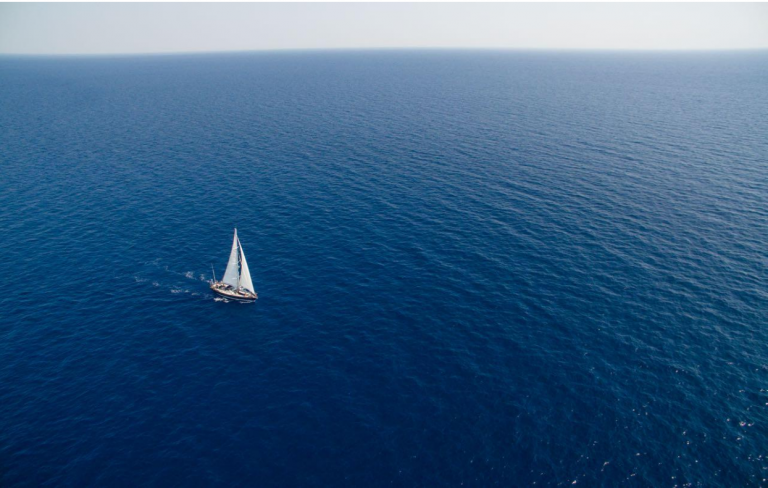
It’s made up of different parts.
There is the hull, the crew, the mast, the sail, compass and a map. All of these elements represent a different aspect of your life. Understanding their relationship to each other is the key to understanding and balancing your own life.
Let’s look at all of them in more detail.
Składa się z różnych części.
Jest kadłub, załoga, maszt, żagiel, kompas i mapa.
Wszystkie te elementy reprezentują inny aspekt twojego życia. Zrozumienie ich wzajemnego związku jest kluczem do zrozumienia i równoważenia własnego życia.
Przyjrzyjmy się im wszystkim bardziej szczegółowo.
The Hull
Kadłub
The hull represents your habits – things you do every day.
Kadłub reprezentuje twoje nawyki – rzeczy, które robisz na co dzień.
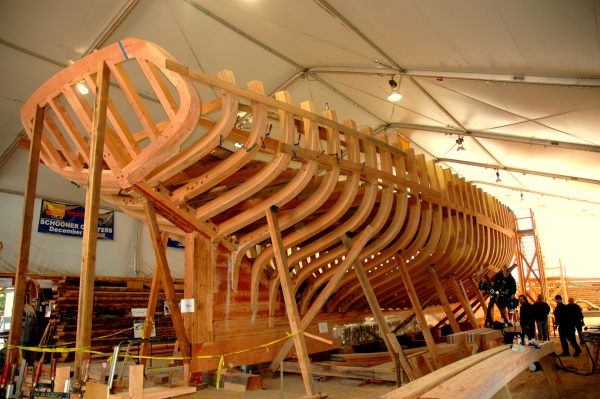
The hull is the most important part of the boat because it gives it its shape. The size and shape of the hull determines the type of the boat you are.
Kadłub jest najważniejszą częścią łodzi, ponieważ nadaje jej kształt. Rozmiar i kształt kadłuba określa typ łodzi, którą jesteś.
First of all you need to make sure that your hull is shaped the right way with a buoyant and smoothly curved body, otherwise your boat won’t be stable on the waves and the next larger wave will tip your boat over.
Przede wszystkim musisz upewnić się, że twój kadłub jest ukształtowany we właściwy sposób z pływającym i gładko zakrzywionym korpusem, w przeciwnym razie twoja łódź nie będzie stabilna na falach, a następna większa fala przewróci twoją łódź do góry nogami.
You want to change your hull from this:
Chcesz zmienić swój kadłub z tego:
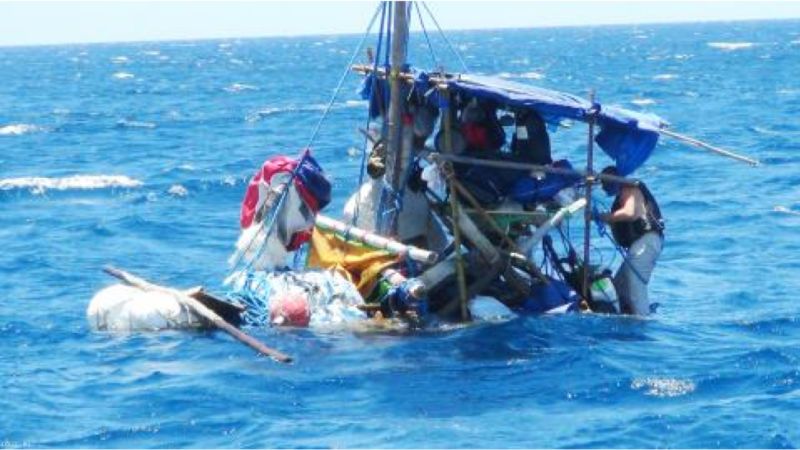
To this:
Na to:
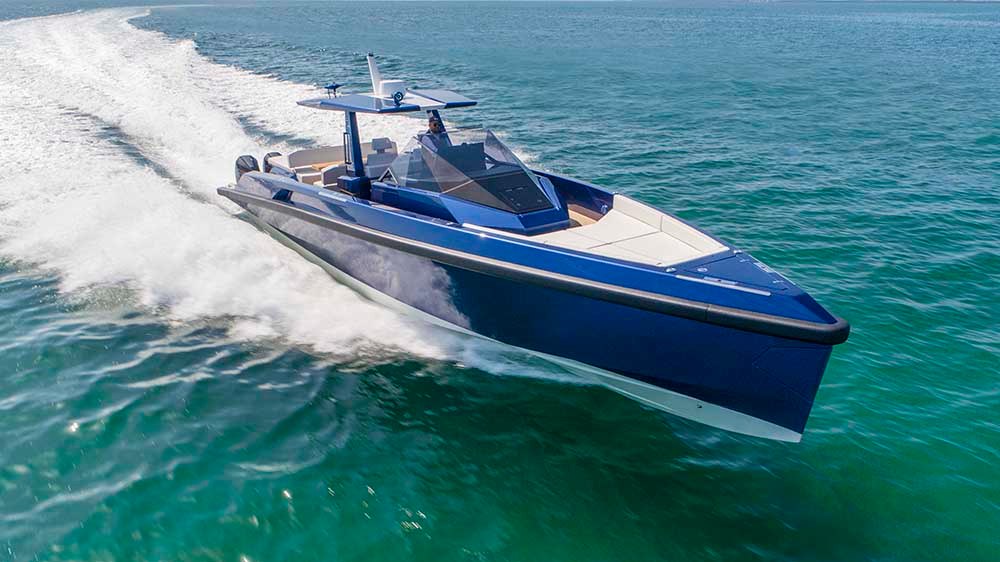
That’s why you need to make sure your habits are well balanced and can keep you afloat in any kind of weather.
Remember that it’s easy to stay on top when the waters are still and any type of hull will hold up in easy conditions.
However, when an inevitable storm comes and the waves become challenging, only a sturdy and well shaped hull will have no problem staying afloat.
Dlatego musisz upewnić się, że twoje nawyki są dobrze wyważone i mogą utrzymać cię na powierzchni przy każdej pogodzie.
Pamiętaj, że łatwo jest utrzymać się na szczycie, gdy woda jest spokojna, a każdy rodzaj kadłuba wytrzyma w łatwych warunkach.
Jednak gdy nadejdzie nieunikniona burza i fale staną się trudne, tylko solidny i dobrze ukształtowany kadłub nie będzie miał problemu z utrzymaniem się na powierzchni.
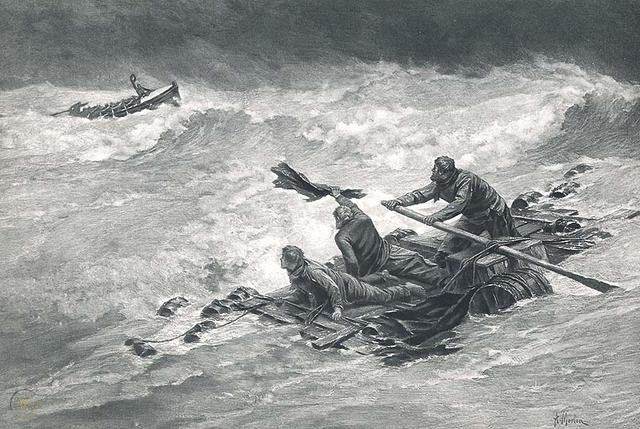
The goal here is to build your hull – your habits – with materials that fit nicely together and create a tight and sturdy backbone to your boat.
Choosing high quality habits – meditation, reading, healthy diet, good sleep hygiene, daily gratitude, stretching, pomodoro, is always wiser than lower quality habits such as watching too much TV, consuming a high sugar diet, complaining or getting drunk every weekend.
Celem jest zbudowanie twojego kadłuba – nawyków – z materiałów, które dobrze do siebie pasują i tworzą ciasną i wytrzymałą podporę łodzi.
Wybieranie wysokiej jakości nawyków – medytacja, czytanie, zdrowa dieta, dobra higiena snu, codzienna wdzięczność, rozciąganie, pomodoro, jest zawsze mądrzejsze niż nawyki niższej jakości, takie jak oglądanie zbyt dużej ilości telewizji, spożywanie diety wysokocukrowej, narzekanie lub upijanie się w każdy weekend.
Low quality materials will force you to dedicate your precious time and energy to constant repairs and patching up leaky holes.
Materiały niskiej jakości zmuszą Cię do poświęcenia cennego czasu i energii na ciągłe naprawy i łatanie dziur.
That said, it’s not enough to simply pick a high quality habit like reading and add it to your hull without considering where and how you’re placing it. A misplaced high quality item can often be more detrimental than a well placed low quality one. That’s why you need to look at your hull as a whole and see how all these different habits fit together.
To powiedziawszy, nie wystarczy po prostu wybrać wysokiej jakości nawyk, taki jak czytanie, i dodać go do kadłuba, nie zastanawiając się, gdzie i jak go umieszczasz. Niewłaściwie umieszczony przedmiot wysokiej jakości często może być bardziej szkodliwy niż dobrze umieszczony przedmiot niskiej jakości. Dlatego musisz spojrzeć na swój kadłub jako całość i zobaczyć, jak wszystkie te różne nawyki do siebie pasują.
Are your diet and sleep habits in sync?
Is your work ethic helping you relax in the evening?
Is reading supporting or slowing down your productivity?
Is it better for your mental health if you journal at the beginning or the end of the day?
Czy twoja dieta i nawyki snu są zsynchronizowane?
Czy etyka pracy pomaga Ci zrelaksować się wieczorem?
Czy czytanie wspiera czy spowalnia twoją produktywność?
Czy lepiej dla twojego zdrowia psychicznego jest prowadzenie dziennika na początku czy na końcu dnia?
Luckily, you don’t need to put it all together at once.
First, identify the materials you want to build your boat with, then focus on one high quality habit at the time. Try it in different variations over a period of time and see what variation works best for you. Then move to the next and see if you can fit them together. Maybe you’ll have to go back to your first habit and change it a bit so that it fits the second one a little bit better. Then you do the same with the third and forth and so on.
Na szczęście nie musisz tego wszystkiego składać na raz.
Najpierw zidentyfikuj materiały, z których chcesz zbudować swoją łódź, a następnie skup się na jednym nawyku wysokiej jakości w danym momencie. Wypróbuj go w różnych odmianach przez pewien czas i zobacz, jaka odmiana jest dla Ciebie najlepsza. Następnie przejdź do następnego i zobacz, czy możesz je do siebie dopasować. Może będziesz musiał wrócić do pierwszego nawyku i trochę go zmienić, aby pasował trochę do drugiego. Następnie robisz to samo z trzecim i czwartym i tak dalej.
The good news is that with every new healthy habit you add it will be easier to match it with the rest because the body of your boat will start taking shape and you’ll know what type of hull you’re going for.
The first two good habits are generally the hardest.
Don’t overdo it either. You don’t have to become a bulk carrier in one year. A small but robust fishing boat can withstand a storm just the same.
Dobrą wiadomością jest to, że z każdym nowym zdrowym nawykiem łatwiej będzie dopasować go do reszty, ponieważ korpus twojej łodzi zacznie nabierać kształtu i będziesz wiedziała, jaki rodzaj kadłuba tworzysz.
Pierwsze dwa dobre nawyki są na ogół najtrudniejsze.
Nie przesadzaj też. Nie musisz zostać lotniskowcem po jednym roku. Mała, ale solidna łódź rybacka może tak samo przetrwać burzę.

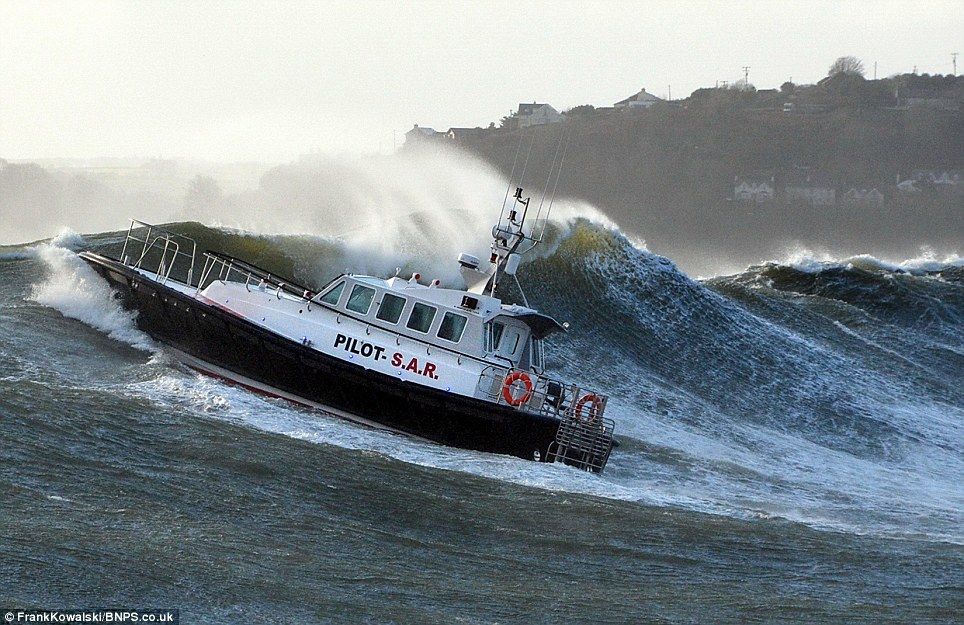
The best way is to strive for making your boat’s body sturdier and sturdier throughout your life, constantly reinforcing it with good habits.
Najlepszym sposobem jest dążenie do tego, aby przez całe życie nadwozie łodzi było coraz mocniejsze, stale wzmacniając je dobrymi nawykami.
The Crew
Załoga
Even the most magnificent of ships can crash into a reef or rust if it isn’t operated by a skilled crew.
The crew of your boat are your thoughts – the mindset and decisions you make.
Nawet najwspanialszy ze statków może rozbić się o rafę lub zerdzewieć, jeśli nie jest obsługiwany przez wykwalifikowaną załogę.
Załoga twojej łodzi to twoje myśli – sposób myślenia i decyzje, które podejmujesz.
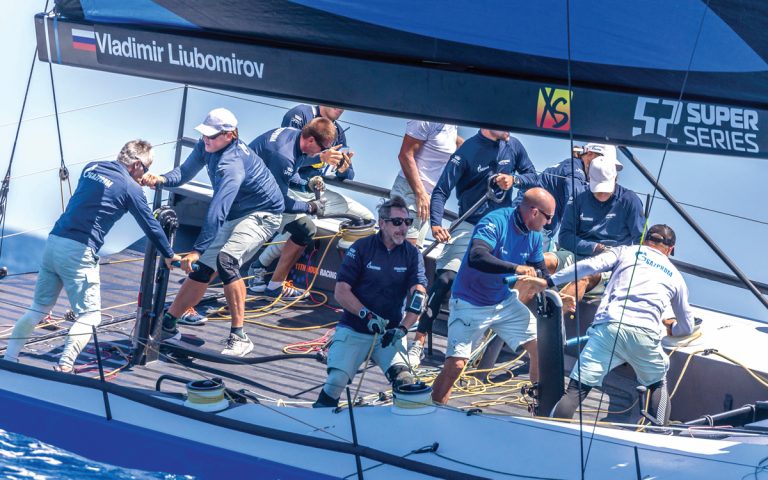
Your crewmates are incredibly versatile.
Most of the time they maintain your ship – clean the deck, untangle the ropes, tighten the knots, unfold the sail. Their jobs are mostly mundane and repetitive.
Twoi marynarze są niesamowicie wszechstronni.
Przez większość czasu zajmują się konserwacją twojego statku – czyszczeniem pokładu, rozplątywaniem lin, zaciskaniem węzłów, rozkładaniem żagla. Ich praca jest w większości nieinteresująca i powtarzalna.
However, should the need arise, they can also do special tasks like repair the engine or patch a leaky hole in the hull. They can improve parts of your ship, defend your boat from pirates, invent new ways of doing things or get the trident out and catch the occasional big fish.
Jednak w razie potrzeby mogą również wykonywać zadania specjalne, takie jak naprawa silnika lub załatanie dziury w kadłubie. Mogą ulepszyć części twojego statku, obronić twoją łódź przed piratami, wymyślić nowe sposoby robienia rzeczy lub wyciągnąć trójząb i od czasu do czasu złowić dużą sztukę.
The thing to remember about your laborious sailors is that they generally aren’t very reflective and simply do what you tell them to. And if you assign them to pointless or self-sabotaging tasks they’ll do them.
That’s where self-doubt, mindless scrolling through Instagram or choosing donuts over a salad comes from – your sailors simply do the same job over and over again because you haven’t trained them to do things differently.
Your crew – thoughts – need constant training.
Należy pamiętać o swoich pracowitych żeglarzach, że generalnie nie są zbyt refleksyjni i po prostu robią to, co im każesz. A jeśli przydzielisz ich do bezsensownych lub samosabotażujących zadań, to je wykonają.
Stąd bierze się zwątpienie, bezmyślne przeglądanie Instagrama lub wybieranie pączków zamiast sałatki – twoi marynarze zwykle wykonują tę samą pracę w kółko, ponieważ nie wyszkoliłeś ich, aby robić rzeczy inaczej.
Twoja załoga – myśli – potrzebuje ciągłego szkolenia.
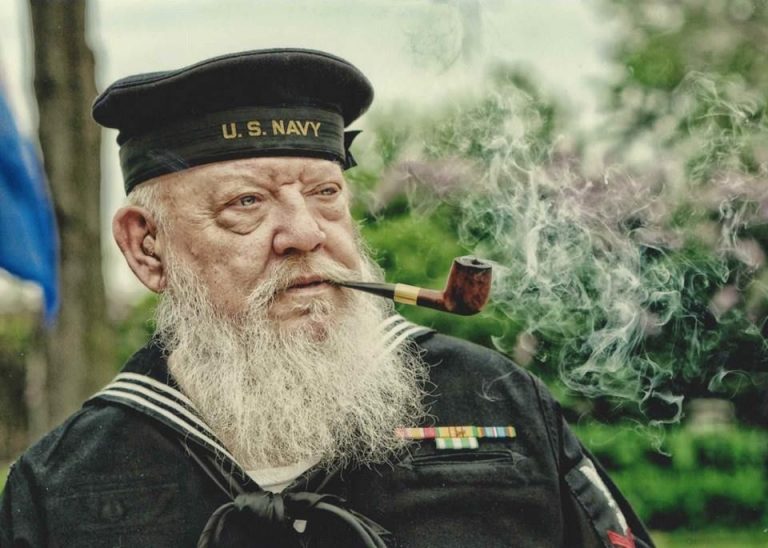
Consider smoking for a second.
Think of it as a low quality habit that represents a low quality part of your hull which slowly leaks water into your lower deck. It doesn’t have immediate negative effects, but over time will likely sink your boat
Rozważ przez chwilę palenie.
Pomyśl o tym jako o niskiej jakości nawyku, który reprezentuje niskiej jakości część twojego kadłuba, z której powoli przecieka woda na dolny pokład. Nie ma to natychmiastowych negatywnych skutków, ale z biegiem czasu prawdopodobnie zatonie twoją łódź.
You’re aware of it and desperately want to patch that hole in your hull, however, your sailors simply aren’t trained in the task to ‘quit smoking’. In other words, they have no idea how to do it.
Jesteś tego świadomy i desperacko chcesz załatać tę dziurę w kadłubie, jednak twoi marynarze po prostu nie są przeszkoleni w zadaniu „rzucanie palenia”. Innymi słowy, nie mają pojęcia, jak to zrobić.
Still you put them to work, they patch the hole one way or another but almost always the job is sloppy and the hole starts leaking again.
That’s why you might only quit smoking for a week, a month or 4 months but ultimately the bad habit creeps its way back into your life.
Wciąż zmuszasz ich do pracy, łatają dziurę w taki czy inny sposób, ale prawie zawsze praca jest niedbała i dziura znowu zaczyna przeciekać.
Dlatego możesz rzucić palenie tylko na tydzień, miesiąc lub 4 miesiące, ale ostatecznie zły nawyk wkrada się z powrotem do twojego życia.
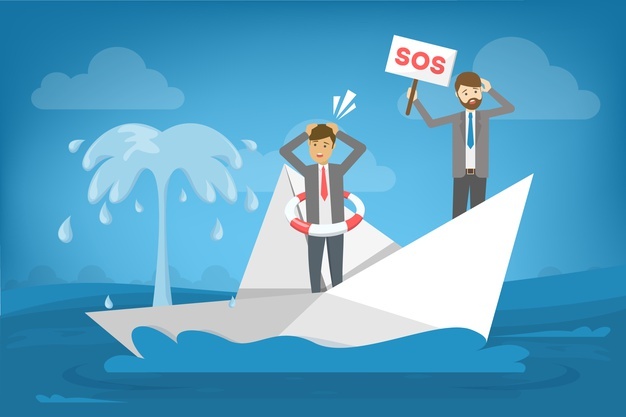
The same goes for eating sugar, comparing yourself to others, choosing things you know are bad for you or feeling inadequate in your parents’ eyes.
It’s your crewmates, your thoughts and decisions, doing the same tasks over and over again because they haven’t received proper training in dealing with these issues.
To samo dotyczy jedzenia cukru, porównywania się z innymi, wybierania rzeczy, o których wiesz, że są dla Ciebie złe lub poczucia się nieodpowiednim w oczach rodziców.
To twoja załoga, twoje myśli i decyzje, wykonują w kółko te same zadania, ponieważ nie dostali odpowiedniego treningu w radzeniu sobie z tymi problemami.
So how do you train your thoughts?
You educate yourself.
Jak więc trenujesz swoje myśli?
Kształcąc się.

You actively search the internet for ‘effective ways to quit smoking’ and try different strategies, one by one, until it works. Then, perhaps when your sailors have effectively dealt with the leaky hull problem, they then can apply the same strategy to eliminate sugar from your diet. Or it doesn’t work and you’ll have to choose other solutions.
This is why reading books and listening to podcasts is so useful because you can experience people you resonate with explaining their crewmates’ work.
Aktywnie przeszukujesz internet w poszukiwaniu „skutecznych sposobów na rzucenie palenia” i wypróbowujesz różne strategie, jedna po drugiej, aż zadziałają. Wtedy, być może, gdy twoi marynarze skutecznie uporają się z problemem nieszczelnego kadłuba, mogą zastosować tę samą strategię, aby wyeliminować cukier z diety. Lub jeśli to nie zadziała to będziesz musiała wybrać inne rozwiązania.
Dlatego czytanie książek i słuchanie podcastów jest tak przydatne, ponieważ możesz doświadczyć ludzi, z którymi rezonujesz, którzy wyjaśniają pracę ich własnych marynarzy.
And with time your team will become more skilled at all kinds of tasks, which in turn will help your boat sail faster, more effectively and with less effort!
Understand that most of the effort in your life comes from your thoughts dealing with tasks they aren’t qualified for.
A z czasem twój zespół nabierze umiejętności we wszelkiego rodzaju zadaniach, co z kolei pomoże twojej łodzi żeglować szybciej, efektywniej i przy mniejszym wysiłku!
Zrozum, że większość wysiłku w twoim życiu pochodzi z twoich myśli zmagających się z zadaniami, do których nie mają kwalifikacji.
A quick note on the self-improvement industry. I see that it’s often badly perceived in our society, but in reality, the self-development sector, is simply a bunch of boats sharing ideas on different types of training they’ve applied to their crewmates. Some of it will be helpful to you, some of it won’t.
But all of it is useful to absorb.
Krótka uwaga na temat branży samodoskonalenia. Widzę, że w naszym społeczeństwie jest to często źle postrzegana, ale w rzeczywistości sektor samorozwoju jest to po prostu gromada łodzi dzielących się pomysłami na temat różnych szkoleń, na które wysłali swoich marynarzy. Niektóre z nich będą dla ciebie pomocne, inne nie.
Ale wszystko jest przydatne do wchłonięcia.
The Mast
Maszt
No boat is complete without its magnificent mast.
The mast represents your self-esteem or how highly you think of yourself. (get it? 
Żadna łódź nie jest kompletna bez wspaniałego masztu.
Maszt reprezentuje twoją samoocenę czyli to, jak wysoko o sobie myślisz. (kumasz? 
It’s also the most distinct feature of your boat and what people notice first about you. You’re often judged first for the size of your mast.
Jest to również najbardziej charakterystyczna cecha twojej łodzi i to, co ludzie zauważają u Ciebie jako pierwsze. Często jesteś oceniany w pierwszej kolejności z rozmiaru twojego masztu.
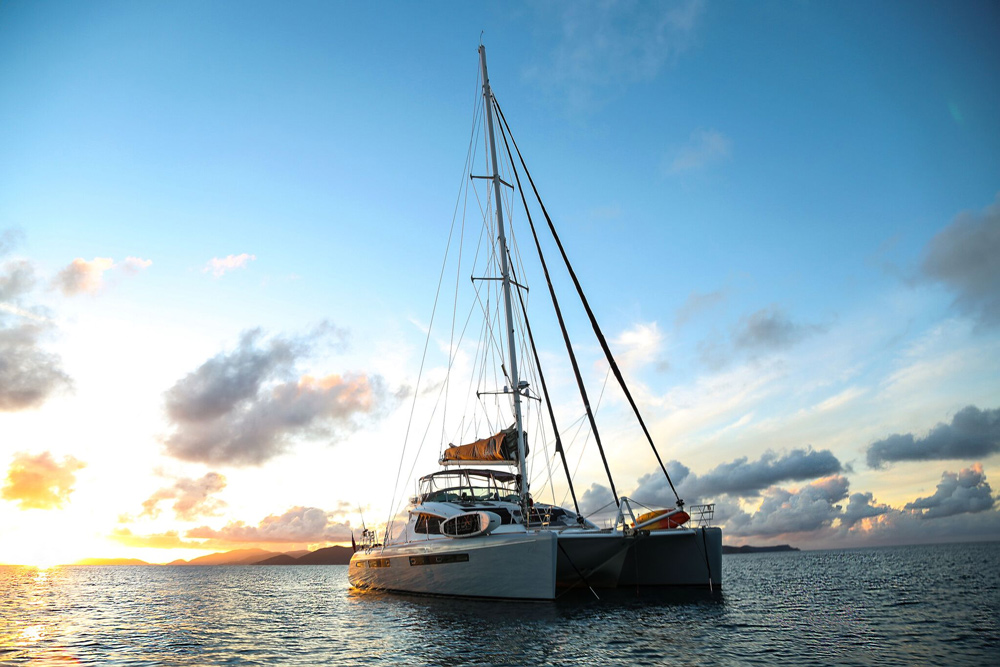
The mast is deeply rooted in the boat’s hull. The stronger the hull the more secure the mast will be.
Another way of looking at the mast is your ego.
It’s important not to reject your ego as something evil or a thing to be rid off. Your ego can be a beautiful and useful part of your boat, providing its height is proportionate to your boat’s size.
A large mast on a tiny boat will tip it over when blown by the first gust of wind or a larger wave.
Maszt jest głęboko osadzony w kadłubie łodzi. Im mocniejszy kadłub, tym bezpieczniejszy będzie maszt.
Innym sposobem patrzenia na maszt jest twoje ego.
Ważne jest, aby nie odrzucać swojego ego jako czegoś złego lub rzeczy, której należy się pozbyć. twoje ego może być piękną i użyteczną częścią twojej łodzi, pod warunkiem, że jej wysokość jest proporcjonalna do wielkości twojej łodzi.
Duży maszt na maleńkiej łódce przewróci ją pod wpływem pierwszego podmuchu wiatru lub większej fali.

Similarly, a mast that is too small for its boat won’t have any strength to push that boat forward. The boat will mostly stay in one place.
You want your mast to be just the right size and you want to make it stronger and more grounded as your boat grows in size.
Podobnie maszt, który jest za mały dla swojej łodzi, nie będzie miał siły, aby popchnąć tę łódź do przodu. Łódź w większości pozostanie w jednym miejscu.
Chcesz, aby twój maszt był odpowiedniego rozmiaru i chcesz, aby był mocniejszy i bardziej uziemiony w miarę zwiększania się łodzi.
Once again, the mast is your own self-esteem, the way you regard yourself and what you think about yourself.
The mast is the respect you have for yourself.
It is your self-love.
Jeszcze raz, maszt to twoja własna samoocena, sposób, w jaki postrzegasz siebie i co o sobie myślisz.
Maszt to szacunek, jaki masz dla siebie.
To twoja miłość do siebie.
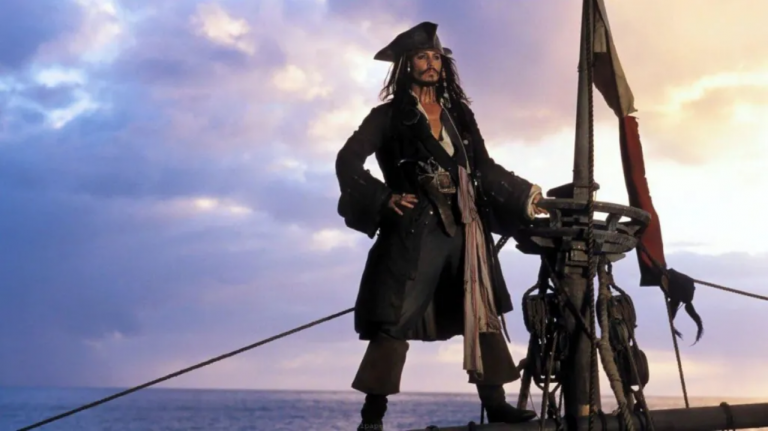
Being selfish, egocentric and self-absorbed means your mast is much too high for your boat’s size, causing you more problems than it is adding value.
It’s too large for your crewmates to handle and it constantly tips your boat over, plunging your crew into a long and arduous process of getting it back on the waves (only to have it tipped over again).
Bycie samolubnym, egocentrycznym i pochłoniętym sobą oznacza, że masz zbyt wysoki maszt w stosunku do rozmiaru łodzi, co powoduje więcej problemów niż wartości dodanej.
Jest zbyt duży, aby twoi marynarze mogli sobie z nimi poradzić, i stale przewraca twoją łódź, pogrążając twoją załogę w długim i żmudnym procesie przywracania jej na fale (tylko po to, by ponownie się przewróciła).
Being fearful, anxious, insecure and pessimistic means your mast is too small to do anything useful. Your sailors rarely man it and instead occupy themselves with other tasks around the deck.
You can think of the size of your mast as a spectrum:
Strach, niepokój, niepewność i pesymizm oznaczają, że twój maszt jest za mały, aby zrobić cokolwiek pożytecznego. Twoi marynarze rzadko go obsługują i zamiast tego zajmują się innymi zadaniami na pokładzie.
Możesz myśleć o rozmiarze masztu jako o spektrum:

You want your mast size to be somewhere in the green region. You can determine its current height by looking at your crewmates’ behaviour.
Chcesz, aby rozmiar masztu był gdzieś w zielonym regionie. Możesz określić jego aktualną wysokość, obserwując zachowanie twojej załogi.
Are they often occupied trying to bring your boat back to balance after yet another self-sabotage? Are you able to discern what went wrong? Are you ever at fault or is it always something else that happens to you?
Do you think about others more than about yourself? Are you more occupied serving the will of other people rather than taking care of yourself and doing what’s important to you? Is your life on autopilot, doing the same thing day in and day out?
Czy często są zajęci próbą przywrócenia równowagi łodzi po kolejnym samosabotażu? Czy jesteś w stanie rozpoznać, co poszło nie tak? Czy kiedykolwiek jesteś winny, czy zawsze dzieje się coś innego?
Czy myślisz o innych bardziej niż o sobie? Czy jesteś bardziej zajęta służeniem woli innych ludzi niż dbaniem o siebie i robieniem tego, co jest dla Ciebie ważne? Czy twoje życie jest na autopilocie, robiąc to samo dzień w dzień?
You determine the right height of your mast with honest reflection and by directing the actions of your crewmates towards self-care.
Właściwą wysokość masztu ustalasz za pomocą uczciwej refleksji i ukierunkowując działania marynarzy w stronę opieki nad sobą.
The Sail
Żagiel
Once your hull is sturdy, your crew well trained and your mast the right size, you can safely attach a big sail to it.
The sail represents your drive.
It’s what keeps you going, what helps you stay focused and excited about whatever you’re doing. The sail is your motivation and ambition.
Gdy kadłub jest solidny, załoga dobrze wyszkolona, a maszt odpowiedniego rozmiaru, możesz bezpiecznie przymocować do niego duży żagiel.
Żagiel reprezentuje twoją siłę napędową.
To jest to, co Cię napędza, co pomaga Ci pozostać skoncentrowanym i podekscytowaną tym, co robisz. Żagiel to twoja motywacja i ambicja.

Before we dive into the properties of the sail, it’s important to understand the properties of the ocean around you.
Once again the endless ocean represents the life outside of you.
Zanim zagłębimy się we właściwości żagla, ważne jest, aby zrozumieć właściwości otaczającego Cię oceanu.
Po raz kolejny nieskończony ocean reprezentuje życie na zewnątrz Ciebie.
What’s important to consider is that the weather in the ocean is always changing and effective sailing means adjusting to these conditions.
There will be times when you can’t catch any wind in your sail, no matter how wide you stretch it.
That’s ok.
Należy wziąć pod uwagę, że pogoda na oceanie ciągle się zmienia, a efektywne żeglowanie oznacza dostosowywanie się do tych warunków.
Będą chwile, kiedy nie będziesz w stanie złapać wiatru w żagle, bez względu na to, jak szeroko go rozciągniesz.
To jest porządku.
During these periods the best course of action is to fold the sail and let your boat float atop the waves. You don’t always have to sail somewhere, sometimes it’s alright to just be in one place and relax.
Other times the wind will blow strong, filling up your sail. That’s when you put your sailors to work to make sure you harness every bit of that natural driving force.
W tych okresach najlepiej jest złożyć żagiel i pozwolić łodzi unosić się na falach. Nie zawsze musisz gdzieś płynąć, czasami wystarczy być w jednym miejscu i odpocząć.
Innym razem wiatr będzie wiał silny, wypełniając żagiel. To wtedy zmuszasz swoich żeglarzy do pracy, aby mieć pewność, że wykorzystasz każdą część tej naturalnej siły napędowej.
Reading the weather of life is an expertise that needs to be consciously developed. The more you pay attention to the ever-changing life conditions the more you’ll be able to recognise them from afar. With time, predicting and preparing for storms or periods of no wind will become of second nature to you.
There are two things you need to remember about the sail:
(1) its size and (2) its attachment to the mast.
Czytanie pogody życia to wiedza, którą należy świadomie rozwijać. Im bardziej zwracasz uwagę na stale zmieniające się warunki życia, tym bardziej będziesz w stanie je rozpoznać z daleka. Z czasem przewidywanie i przygotowywanie się na burze lub okresy bezwietrzne stanie się dla ciebie drugą naturą.
Są dwie rzeczy, o których należy pamiętać o żaglu:
(1) jego rozmiar i (2) jego przymocowanie do masztu.
(1) The sail's size
Generally speaking, the larger the sail (your ambition) the faster it’ll drive your boat forward. However, a very large sail becomes highly dangerous in times of crisis like a storm, and can easily rip your mast off the hull and fly away with it. We call that the identity crisis. That’s why it’s so crucial that your mast is securely grounded in your hull, your habits.
In times when the wind is absent and the boat sits still, a large sail will take hours to fold and pack up. Unless your sailors are properly trained in taking the sail off your mast quickly, the times of stillness will preoccupy your thoughts with your unfulfilled ambition.
Ogólnie rzecz biorąc, im większy żagiel (twoja ambicja), tym szybciej popycha Twoją łódź do przodu. Jednak bardzo duży żagiel staje się bardzo niebezpieczny w sytuacjach kryzysowych, takich jak burza, i może z łatwością oderwać maszt od kadłuba i odlecieć z nim. Nazywamy to kryzysem tożsamości. Dlatego tak ważne jest, aby maszt był bezpiecznie osadzony w kadłubie, w twoich nawykach.
W czasach, gdy nie ma wiatru, a łódź stoi nieruchomo, złożenie i spakowanie dużego żagla zajmie kilka godzin. O ile twoi żeglarze nie są odpowiednio przeszkoleni w szybkim zdejmowaniu żagla z masztu, czasy ciszy zaprzątają twoje myśli nad twoją niespełnioną ambicją.
(2) The sail's attachment
Similarly, the way the sail – your ambition – is attached to the mast – your self-esteem – has a huge impact on what’s happening to your boat.
A strong and sturdy mast can support the largest of sails without much need for your sailors’ help. This means that a healthy self-esteem can support bigger ambitions and drive your life forward, while your thoughts are put to good use elsewhere.
Podobnie sposób, w jaki żagiel – twoja ambicja – jest przymocowany do masztu – twojej samooceny – ma ogromny wpływ na to, co dzieje się z twoją łodzią.
Mocny i wytrzymały maszt może podtrzymywać największe żagle bez większej pomocy twoich żeglarzy. Oznacza to, że zdrowa samoocena może wspierać większe ambicje i napędzać twoje życie, podczas gdy twoje myśli są dobrze wykorzystywane gdzie indziej.
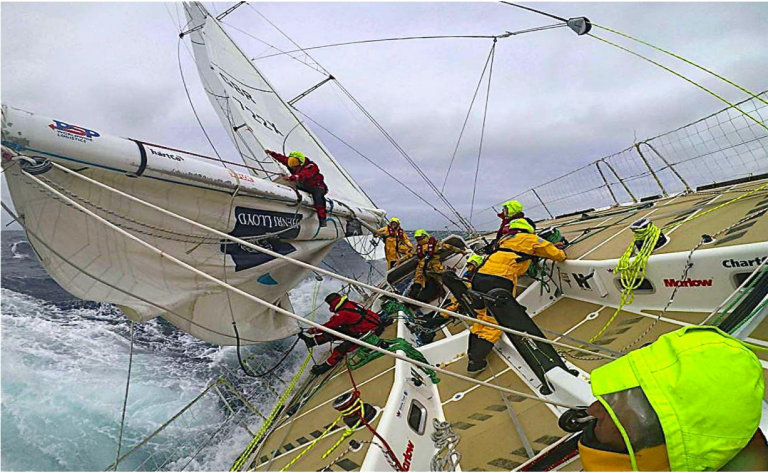
However, if the sail is poorly attached, or the mast cannot handle it, you’ll have to dedicate most of your sailors to holding the sail manually by the ropes.
This is what working under stress is. You cannot think about anything else but work and the things you have to do. That’s because you don’t trust yourself and believe in your own ability, because your habits (the hull) and work ethic (the mast) aren’t able to withstand the strong wind (work commitments) blowing into your sail.
Jednakże, jeśli żagiel jest źle zamocowany lub maszt nie może sobie z nim poradzić, będziesz musiała poświęcić większość swoich żeglarzy na ręczne trzymanie żagla na linach.
Na tym polega praca w stresie. Nie możesz myśleć o niczym innym poza pracą i rzeczami, które musisz zrobić. Dzieje się tak dlatego, że nie ufasz sobie i nie wierzysz we własne możliwości, ponieważ twoje nawyki (kadłub) i etyka pracy (maszt) nie są w stanie wytrzymać mocnego wiatru (zobowiązań z pracy) dmuchającego w twój żagiel.
The Compass
Kompas
The ocean you’re sailing on is endless. On top of that, although all directions are equal, they all lead to different places. Naturally, your boat can only sail in one direction at a time.
That’s why you need to use a compass to point you in the direction that is most suitable to you.
Ocean, po którym płyniesz, jest nieskończony. Co więcej, mimo że wszystkie kierunki są sobie równe, wszystkie prowadzą do różnych miejsc. Oczywiście, twoja łódź może płynąć tylko w jednym kierunku na raz.
Dlatego musisz użyć kompasu, aby wskazał ci kierunek, który jest dla ciebie najbardziej odpowiedni.
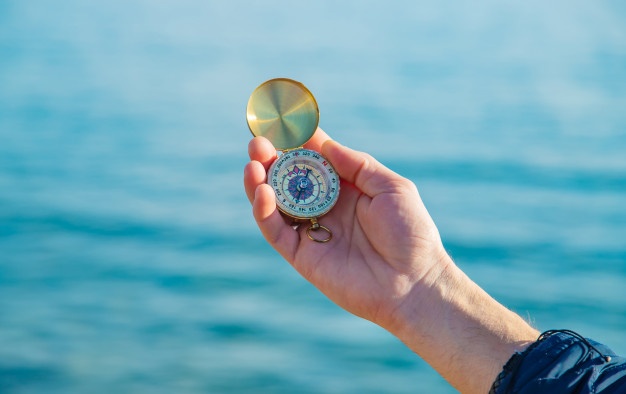
The compass represents your values.
Values are ideals that are important to you personally.
Most of the time they are the silent drivers of your decisions.
Values regulate your happiness and establish your level of fulfilment. For example, if you’re happy in your job or whether you’re in a relationship with the right person.
Kompas reprezentuje twoje wartości.
Wartości to ideały, które są dla Ciebie ważne osobiście.
Przez większość czasu są cichymi motorami twoich decyzji.
Wartości regulują twoje szczęście i ustalają twój poziom spełnienia. Na przykład, czy jesteś szczęśliwa w swojej pracy lub czy jesteś w związku z właściwą osobą.
Your compass is always pointing somewhere, but unless you understand your own values, the direction might not be clear to you.
You can think about it as having your compass locked away in a drawer. It certainly is still pointing at something, but its arrow is hidden from your eyes.
Twój kompas zawsze gdzieś wskazuje, ale jeśli nie rozumiesz własnych wartości, kierunek może nie być dla ciebie jasny.
Możesz myśleć o tym jak o zamknięciu kompasu w szufladzie. Z pewnością wciąż na coś wskazuje, ale jego strzała jest ukryta przed twoimi oczami.
To ensure that the direction of your sailing is aligned with the arrow of your compass you need to keep it in a visible place, as close to the steering wheel as possible.
Aby upewnić się, że kierunek twojego żeglowania jest zgodny ze strzałką kompasu, musisz trzymać go w widocznym miejscu, jak najbliżej steru.
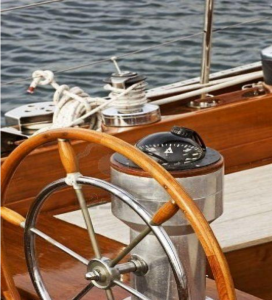
You do that in life by taking the time to clearly define your values.
There are plenty of resources online to help you do that. You can start by asking yourself deep questions such as:
Robisz to w życiu, poświęcając czas na jasne zdefiniowanie swoich wartości.
Istnieje wiele zasobów online, które mogą Ci w tym pomóc. Możesz zacząć od zadawania sobie głębokich pytań, takich jak:
What would I do in life, if money wasn’t an issue?
Which injustices I hear about make me deeply emotional?
What do I need from my partner?
Co bym zrobiła w życiu, gdyby pieniądze nie były problemem?
Jakie niesprawiedliwości, o których słyszę, wywołują we mnie głębokie emocje?
Czego potrzebuję od mojego partnera?
When you’ve clearly defined your values, write them on a poster and keep them in a visible place in your house. Think about them daily. Don’t be afraid to update them, if you feel like they aren’t working for you after some time. Remember that your values will change with you.
Kiedy jasno określisz swoje wartości, zapisz je na plakacie i trzymaj w widocznym miejscu w swoim domu. Pomyśl o nich codziennie. Nie bój się je uaktualniać, jeśli po pewnym czasie poczujesz, że nie działają dla Ciebie. Pamiętaj, że wraz z tobą zmienią się twoje wartości.
The thing about the ocean is that as long as you sail in a straight line, no matter which direction you take you will eventually always arrive somewhere.
That said, only sailing in alignment with your values will ensure that the place you discover is the right place for you.
Jeśli chodzi o ocean to rzecz ma się na tym, że dopóki płyniesz w linii prostej, bez względu na kierunek, w którym się wybierasz, w końcu zawsze dotrzesz gdzieś .
To powiedziawszy, tylko żeglowanie w zgodzie z twoimi wartościami zapewni, że miejsce, które odkryjesz, będzie dla Ciebie odpowiednim miejscem.

The place can be a new career, relationship, new place to live, etc.
Then you can decide whether it’s a place where you want to anchor your ship or keep exploring. Arriving at new destinations will always teach you a lot about your values and help update your compass.
Miejscem może być nowa kariera, związek, nowe miejsce do życia itp.
Następnie możesz zdecydować, czy jest to miejsce, w którym chcesz zakotwiczyć swój statek, czy kontynuować eksplorację. Przybywanie do nowych miejsc zawsze nauczy cię wiele o twoich wartościach i pomoże zaktualizować twój kompas.
It’s important to remember that just because you arrived somewhere by following your compass doesn’t necessarily make it the most suitable place for you. In the end, it’s as important to keep an eye on your values at sea as it is on land.
At the same time don’t fall victim to searching for the perfect place because it doesn’t exist and you’ll exhaust yourself chasing it.
Ważne jest, aby pamiętać, że tylko dlatego, że dotarłeś gdzieś, kierując się kompasem, niekoniecznie oznacza to, że jest to najbardziej odpowiednie miejsce dla Ciebie. Na końcu ważne jest, aby mieć swoje wartości na uwadzę, zarówno na morzu, jak i na lądzie.
Jednocześnie nie padnij ofiarą wiecznie szukania idealnego miejsca, ponieważ ono nie istnieje, i wypalisz się od pościgu.
The Map
Mapa
Every sailor knows how foolish it is to navigate the waters without a well updated map. The seas are treacherous and a skilled sailor needs to know where they are and what to expect at all times.
The map represents your knowledge.
Każdy żeglarz wie, jak głupio jest pływać po wodach bez dobrze zaktualizowanej mapy. Morza są zdradliwe, a wykwalifikowany żeglarz musi zawsze wiedzieć, gdzie się znajduje i czego się spodziewać.
Mapa reprezentuje twoją wiedzę.
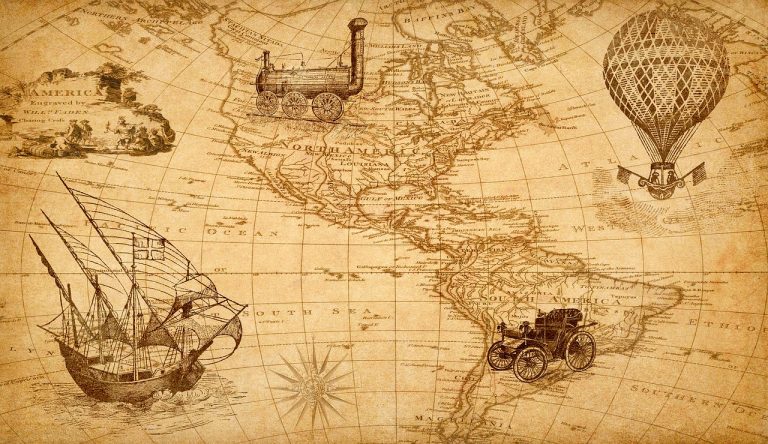
Understanding the sea you’re sailing is equally important as understanding your own boat.
I suggest starting with understanding your values and once those are well established, pay less attention to the compass and more to the sea around you. That’s because your values will always point you in a long straight line; one that crosses many varied aspects of life.
Zrozumienie morza, po którym płyniesz, jest równie ważne, jak zrozumienie własnej łodzi.
Proponuję zacząć od zrozumienia swoich wartości, a kiedy już są one dobrze ugruntowane, zwracaj mniej uwagi na kompas, a więcej na otaczające cię morze. Dzieje się tak, ponieważ twoje wartości zawsze będą wskazywać Ci długą linię prostą; taką, który przecina wiele różnych aspektów życia.
You’re going to have to learn to recognise and avoid shallow waters, dangerous whirlpools, places of heightened storm activity or places where you can get stuck for years without as much as a gust of wind.
Keep working on updating your map by learning about the world. Be up to date with the political and economical situation in your country, understand technological progress, recognise local and global trends, try to find truths that other people miss.
Będziesz musiał nauczyć się rozpoznawać i unikać płytkich wód, niebezpiecznych wirów, miejsc wzmożonej aktywności burzowej lub miejsc, w których możesz utknąć na lata bez nawet podmuchu wiatru.
Kontynuuj pracę nad aktualizacją mapy, poznając świat. Bądź na bieżąco z sytuacją polityczną i ekonomiczną w swoim kraju, zrozum postęp technologiczny, rozpoznawaj lokalne i globalne trendy, staraj się znaleźć prawdy, które umykają innym ludziom.
You don’t need to be an expert at everything, but strive to be well informed at many things.
Nie musisz być ekspertem we wszystkim, ale staraj się być dobrze poinformowany w wielu sprawach.
So here we are
No to dotarliśmy
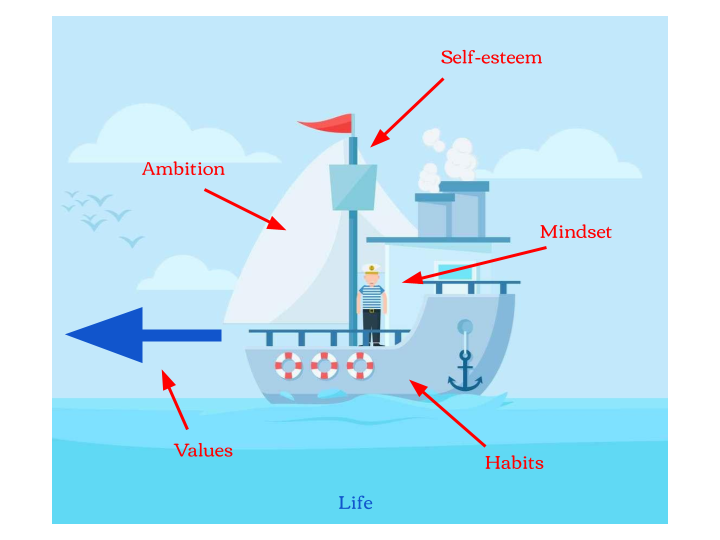
The body and shape of your boat are your habits.
Ciało i kształt twojej łodzi to twoje nawyki.
The crew manning your boat are your thoughts.
Załoga obsługująca twoją łódź to twoje myśli.
The mast holding your sail is your self-esteem.
Maszt trzymający żagiel to twoja samoocena.
The sail pushing you forward is your ambition.
Żagiel popychający Cię do przodu to twoja ambicja.
The compass giving you direction are your values.
Kompas wskazujący kierunek to twoje wartości.
The map that shows you where you are is your knowledge.
Mapa, która pokazuje Ci, gdzie jesteś, to twoja wiedza.
These are the elements you need to understand in order to bring your life to balance.
Są to elementy, które musisz zrozumieć, aby przywrócić równowagę w swoim życiu.
But this isn’t the end of the story.
Ale to nie koniec historii.
Because there is still one element missing that isn’t part of your boat; one that’s an essential part of your experience on the ocean.
You see, so far we’ve been talking about your boat.
But you’re hardly the only boat in the endless ocean.
Ponieważ wciąż brakuje jednego elementu, który nie jest częścią twojej łodzi; taki, który jest istotną częścią twojego doświadczenia na oceanie.
Widzisz, do tej pory rozmawialiśmy o twojej łodzi.
Ale nie jesteś jedyną łodzią na bezkresnym oceanie.
The Other Boats
Inne łodzie

In your travels across the ocean of life you’ll encounter a countless number of other sailors. All at different stages of their own journeys. And at different levels of their own development.
W swoich podróżach po oceanie życia spotkasz niezliczoną liczbę innych żeglarzy. Wszyscy na różnych etapach własnych podróży. I na różnych poziomach własnego rozwoju.
You’ll come across super yachts.
Natkniesz się na super jachty.

And super rafts.
I super tratwy.
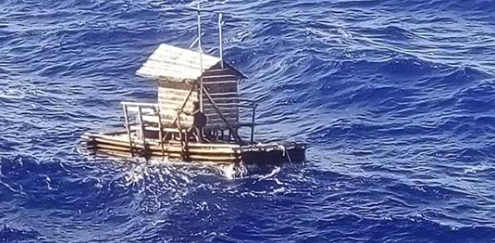
It will be easy for you to look at the yachts and envy them. Likewise, it will be easy to look at the rafts and feel sorry for them.
Instead, allow the yachts to fuel your ambition of what you could be and be grateful for the rafts as they help you appreciate what you already are.
Then replace your envy with humility and your pity with compassion.
Łatwo będzie Ci patrzeć na superjachty i im zazdrościć. Podobnie łatwo będzie patrzeć na tratwy i im współczuć.
Zamiast tego pozwól superjachtom napędzać twoją ambicję tego, kim możesz być i bądź wdzięczny za tratwy, ponieważ pomagają ci docenić to, kim już jesteś.
Następnie zastąp swoją zawiść pokorą, a litość współczuciem.
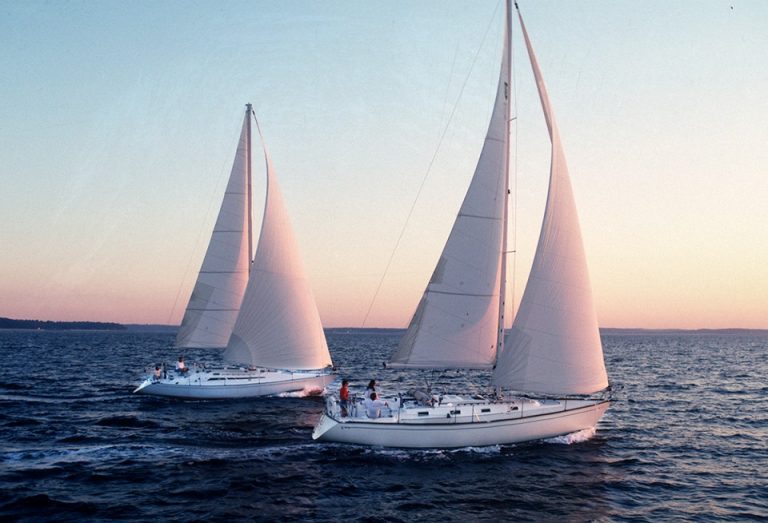
It’s essential for you to learn how to interact with other boats.
You don’t want to end the encounter by having one or both of you knocked off course.
Always try to understand what kind of boat you’re dealing with. Look at the shape of the hull, the height of the mast, the work of the crew, whether the sail is up and filled with wind or down and folded.
Nauczenie się interakcji z innymi łodziami jest bardzo ważne.
Nie chcesz zakończyć spotkania przez zrzucenie jednego lub obu łodzi z kursu.
Zawsze staraj się zrozumieć, z jaką łodzią masz do czynienia. Spójrz na kształt kadłuba, wysokość masztu, pracę załogi, czy żagiel jest podniesiony i napełniony wiatrem, czy opuszczony i złożony.
Every individual is different. Some prefer to be left alone, some are consumed by their ambition, some are looking for attention, others just want to be loved and appreciated.
Take your time to recognise the distinctive features of the boats around you. It’s also helpful to look at another boat’s compass, because you can understand a lot about an individual, if you understand which direction they are going.
Każda osoba jest inna. Jedni wolą zostać sami, inni pochłonięci ambicją, jedni szukają uwagi, inni po prostu chcą być kochani i doceniani.
Nie spiesz się, aby rozpoznać charakterystyczne cechy łodzi wokół ciebie. Pomocne jest również przyjrzenie się kompasowi innej łodzi, ponieważ możesz dużo zrozumieć o jednostce, jeśli rozumiesz, w jakim kierunku zmierza.
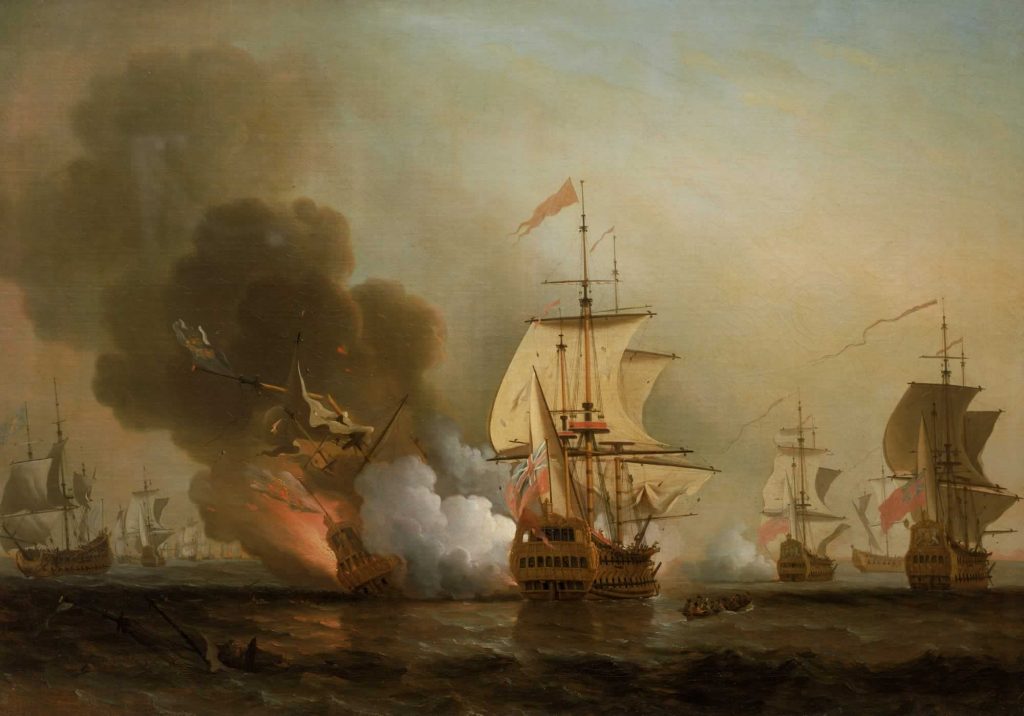
Then also keep in mind that not all boats have pure intentions. There are many vicious ships sailing the waters. They enjoy establishing dominance and have no problem making sure you go under.
You can try to avoid these kinds of ships, but more often than not they look harmless, even when they get close to you.
Pamiętaj też, że nie wszystkie łodzie mają czyste intencje. Po wodach pływa wiele okrutnych statków. Lubią ustanawiać dominację i nie mają problemu z upewnieniem się, że pójdziesz na dno.
Możesz próbować unikać tego rodzaju statków, jednak najczęściej wyglądają one nieszkodliwie, nawet gdy się do ciebie zbliżą.
A better strategy is to train your crewmates in self-defence. Skills like self-assurance, assertiveness and drawing boundaries are effective here.
Cultivating these skills will go a long way in navigating the waters around other ships.
Lepszą strategią jest szkolenie twojej załogi w samoobronie. Skuteczne są tu takie umiejętności, jak pewność siebie, asertywność i wyznaczanie granic.
Kultywowanie tych umiejętności będzie miało duży wpływ na poruszanie się po wodach wokół innych statków.
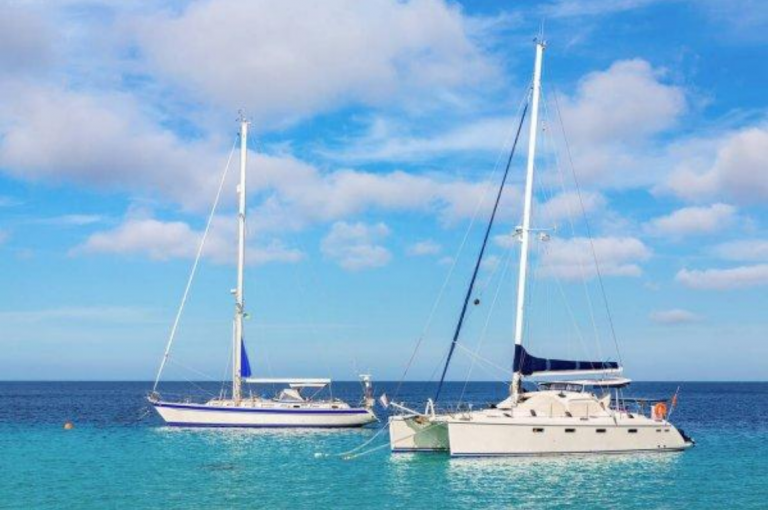
When encountering friendly ships it’s important to remain authentic and open about who you are and where you’re going. This will not only save you from embarrassment and miscommunication but will also signal to the other boat what they can expect from you.
And if it’s not what they need then it’ll save the trouble to both of you.
And if it is, then you can enjoy sailing together in partnership.
Podczas spotkania z przyjaznymi statkami ważne jest, aby pozostać autentycznym i otwartym na to kim jesteś i dokąd zmierzasz. To nie tylko uchroni cię przed zakłopotaniem i nieporozumieniami, ale także zasygnalizuje drugiej łodzi, czego może się od Ciebie spodziewać.
A jeśli to nie jest to, czego potrzebują, zaoszczędzi to kłopotów wam obojgu.
A jeśli tak, to możesz cieszyć się wspólnym żeglowaniem w partnerstwie.
In fact, you’ll do most of your sailing in different forms of partnerships; with your lovers, friends, family, business partners and other boats that found themselves in the same part of the sea as you.
It’s important to remember that all of these boats are, to some extent, following their own sets of values.
W rzeczywistości większość żeglowania będziesz wykonywać w różnych formach partnerstwa; z ukochanymi, przyjaciółmi, rodziną, partnerami biznesowymi i innymi łodziami, które znalazły się w tej samej części morza co ty.
Należy pamiętać, że wszystkie te łodzie do pewnego stopnia kierują się własnymi zestawami wartości.
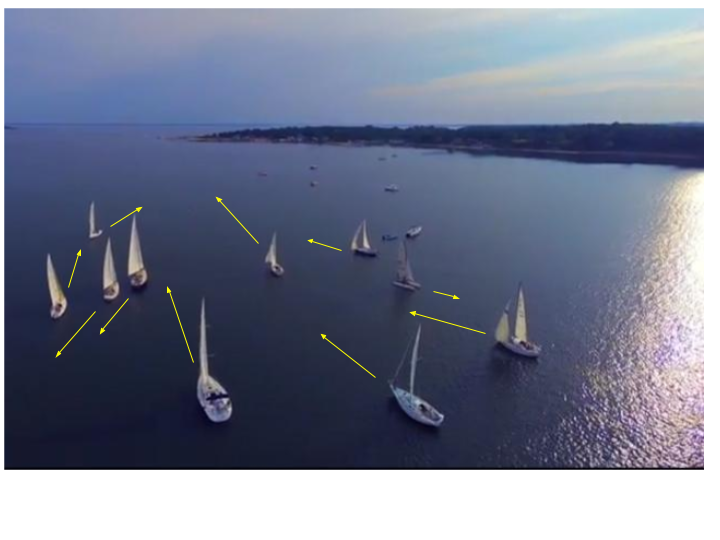
And even though directions in which they sail are aligned with you at the moment, at some point they might diverge and the distance between you will grow. This is a completely natural order of things.
The worst you can do in the situation is go off course from your own direction in order to preserve the connection. Noble actions like that tend to lead to terrible consequences.
I chociaż kierunki w stronę których płyną są w tej chwili zgodne z tobą, w pewnym momencie mogą się różnić, a odległość między wami wzrośnie. To zupełnie naturalny porządek rzeczy.
Najgorsze, co możesz zrobić w tej sytuacji, to zejść z własnego kursu, aby zachować połączenie. Takie szlachetne działania prowadzą do strasznych konsekwencji.
This doesn’t mean that you will always end up sailing alone.
In your travels you will eventually come across boats that sail in the same general direction as you. You’ll enjoy their company for most of your time in the ocean. We call these boats spouses, best friends, children and family.
Nie oznacza to, że zawsze będziesz pływać sam.
Podczas swoich podróży w końcu natkniesz się na łodzie, które płyną w tym samym ogólnym kierunku, co Ty. Będziesz cieszyć się ich towarzystwem przez większość czasu na oceanie. Nazywamy te łodzie małżonkami, najlepszymi przyjaciółmi, dziećmi i rodziną.

You’ll likely form close-knit armadas and traverse the ocean as part of a larger unit.
Prawdopodobnie utworzysz zwarte armady i przemierzysz ocean jako część większej jednostki.
Creating a habit of open and honest communication is crucial for peaceful co-existence in your unit.
Likewise, developing a reputation of high integrity and being someone others can rely upon will go a long way in ensuring lasting stability.
Wytworzenie nawyku otwartej i szczerej komunikacji jest kluczowe dla pokojowego współistnienia w twojej jednostce.
Podobnie, wypracowanie reputacji osoby o wysokiej uczciwości i bycie kimś, na kim inni mogą polegać, znacznie przyczyni się do zapewnienia trwałej stabilności.

In the end don’t ever lose sight of the fact that your boat is merely a tiny part of a much larger ocean, endlessly extending in all directions.
This perspective can help you stay grounded and will prevent you from absorbing yourself too deeply in your day-to-day boat activities.
Na końcu, nigdy nie trać z oczu faktu, że twoja łódź to zaledwie maleńka część znacznie większego oceanu, rozciągającego się bez końca we wszystkich kierunkach.
Ta perspektywa może pomóc ci pozostać na ziemi i zapobiec zbyt głębokiemu pochłonięciu się codziennymi czynnościami na łodzi.
The ocean existed long before your boat was first constructed and it will continue existing long after it finally sinks beneath the waves.
Ocean istniał na długo przed skonstruowaniem twojej łodzi i będzie istniał jeszcze długo po tym, jak w końcu zatonie ona pod falami.
You are lucky to experience its magnificence for a limited time.
Masz szczęście doświadczać jego wspaniałości przez ograniczony czas.
And it’s up to you to make that limited time count.
I od Ciebie zależy, żeby ten ograniczony czas się liczył.
